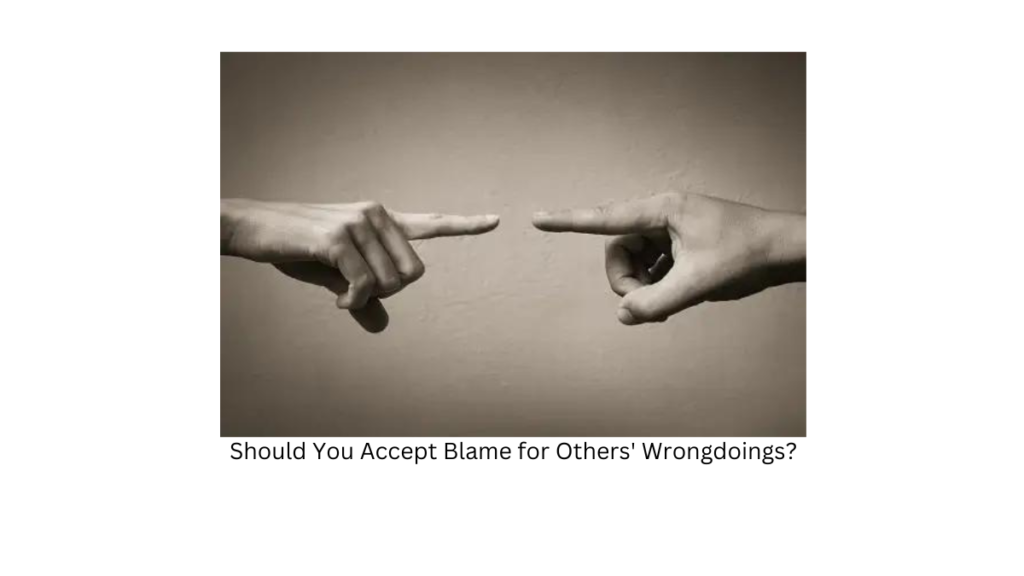Introduction
Should You Accept Blame for Others’ Wrongdoings?

In the complex web of human relationships and interactions, situations often arise where individuals find themselves at a crossroads, faced with a challenging dilemma: should they accept blame for the wrongdoings of others? This ethical question touches upon issues of responsibility, fairness, and the delicate balance between personal accountability and empathy. In this article, we will explore the various aspects of this question and delve into scenarios where accepting blame for others’ actions may or may not be the right course of action.
Understanding the Context Accept Blame
Before delving into the intricacies of whether one should accept blame for the wrongdoings of others, it’s essential to consider the context and circumstances surrounding the situation. Every scenario is unique, and the decision to accept or deny blame depends on a multitude of factors:

- Degree of Involvement: The extent to which you were involved or aware of the wrongdoing is crucial. If you were an active participant or had full knowledge of the act, your responsibility may be different than if you were completely unaware.
- Moral and Legal Implications: Assess whether accepting blame has moral or legal implications. In some cases, it may be ethically right but legally problematic, or vice versa.
- Relationship Dynamics: The nature of your relationship with the wrongdoer and the potential consequences on your relationship if you accept or deny blame plays a significant role in your decision-making.
- Intent vs. Impact: Consider whether the wrongdoer had malicious intent or whether the harm caused was accidental. Intent can influence how blame is assigned.
Personal Values: Your personal values and principles will guide your decision. Some individuals prioritize honesty and accountability, while others may prioritize protecting their own reputation or well-being
Scenarios Where Accepting Blame May Be Appropriate
- Parenting and Caregiving: Parents and caregivers often take responsibility for the actions of their children or those they care for. While children and dependents must learn accountability, adults may choose to accept blame to protect and teach them valuable lessons.
- Leadership Roles: Leaders in various settings, such as workplaces or organizations, often take responsibility for the actions of their teams. Accepting blame can demonstrate leadership and foster a culture of accountability.
- Protecting Others: If accepting blame shields someone vulnerable or prevents severe harm to another person, many would argue that it’s the right thing to do, especially when the wrongdoing was not your own.
- Conflict Resolution: In interpersonal conflicts, accepting partial blame, even when you believe you are not entirely at fault, can de-escalate the situation and promote reconciliation.
- Preserving Relationships: In personal relationships, particularly with loved ones or close friends, accepting blame for minor transgressions can be a gesture of love and understanding. It can help maintain harmony and trust.
Scenarios Where Accepting Blame May Be Inappropriate
- Avoiding Accountability: If accepting blame for someone else’s wrongdoing enables a pattern of irresponsibility, it may not be appropriate. Holding wrongdoers accountable is essential for their growth and development.
- Unfair Consequences: In situations where accepting blame would result in unjust consequences or harm to your well-being, it may be wiser to clarify your innocence or non-involvement.
- Legal Consequences: In cases where accepting blame could lead to legal repercussions, it’s crucial to consult legal counsel before making any admissions of guilt.
- Protecting Your Reputation: There are situations where accepting blame could tarnish your reputation or result in long-term negative consequences. In such cases, preserving your reputation may be a valid concern.
- Respect for Truth: Upholding the truth and maintaining honesty is a fundamental principle for many. Accepting blame when you are innocent might compromise these values.
Balancing Accountability and Empathy

Balancing personal accountability and empathy for others is at the heart of this dilemma. While accepting blame can demonstrate compassion and promote harmonious relationships, it must be done thoughtfully and judiciously. Here are some guidelines for finding this balance:
- Evaluate the Impact: Consider the potential consequences of accepting or denying blame. How will it affect you, the wrongdoer, and others involved? Weigh the impact on all parties involved.
- Communicate Openly: Engage in open and honest communication with the wrongdoer. Discuss the situation, express your concerns, and explore possible resolutions before making a decision.
- Seek Mediation: In situations where conflicts are escalating or complex, involving a neutral third party, such as a mediator or counselor, can help facilitate a fair and constructive resolution.
- Set Boundaries: Establish clear boundaries in your relationships. While empathy is valuable, it should not lead to a pattern of accepting blame for others’ actions to your detriment.
- Prioritize Self-Care: Consider your well-being and mental health. Continuously sacrificing your own peace of mind for the sake of others may not be sustainable.
- Learn from the Experience: Whether you choose to accept or deny blame, use the situation as an opportunity for personal growth and learning. Reflect on what you can take away from the experience.
Conclusion
The question of whether to accept blame for others’ wrongdoings is a complex and nuanced one. It requires careful consideration of the specific context, relationship dynamics, and ethical principles at play. While there are situations where accepting blame can be an act of empathy, love, or leadership, it should not be done at the expense of personal accountability or fairness.
Ultimately, the decision should align with your values and principles, uphold your well-being, and contribute to the growth and development of those involved. Striking the right balance between accountability and empathy is a delicate art, but with thoughtful consideration and open communication, it is possible to navigate these challenging situations with integrity and compassion.
Read more
https://youtu.be/0XtJzy5Gyl4?si=1iFbmzbyHB2y53zP






Your article helped me a lot, is there any more related content? Thanks!